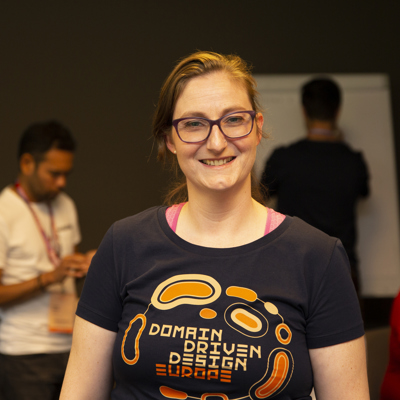NewCrafts Paris 2025
Nicholas Suter
Taming technical debt: from burden to strategic advantage
Let’s flip the table. Instead of considering technical debt like this shapeless burden that just happens to be there, let’s analyse debt’s characteristics and when and how it appears. Then let’s dig into how we can get an accurate view of technical d ...
Johan Martinsson
We don’t need no (more) mock trouble
🧪 Do you really enjoy writing tests with mocks? Or maybe... ➡️ You had a bug in production even though everything was tested? ➡️ You have to change the test when you refactor? ➡️ You’re sometimes lost in mock setups? ➡️ Integration with ...
Patrick Meiler
Serverless Patterns Workshop
Serverless applications are built using many services in a few common architecture patterns. Although customer scenarios are unique, the patterns emerge again and again. Join our hands-on workshop to learn about common serverless and event-driven arc ...
Marjorie Aubert
Continuous experimentation, when software engineers are invested in product and business
Is it virtuous for a company to let its software engineer invest in the product and the business? In contrast to a hands-on approach, we have chosen to take a central role, self-managing, to cover the phases from gathering requirements to following u ...
Emily Bache
How to become a Technical Coach
Technical coaches help software developers to adopt better coding practices. The focus is on the code and the way it is being written, encouraging for example Test-Driven Development, Refactoring and the use of Design Patterns. Coaches contribute to ...
Susanne Kaiser
Team Topologies in Practice: A Journey of Re-Teaming Using Architecture for Flow
In this talk, we'll share our hands-on experience applying Architecture for Flow (combining Wardley Mapping, DDD, and Team Topologies) to transform a growing software organization. Pirate Ship, a growing tech company, faced common scaling challenges: ...
Carola Lilienthal
Domain-Driven Transformation—Modularizing and Modernizing Legacy Software
Starting a new project from scratch with a clean slate is one thing; tackling legacy systems with chaotic architectures is another. Many teams inherit systems described as “Monoliths” or “Big Balls of Mud,” and this talk focuses on how to bring order ...
Arnaud Bailly
Typed λ-calculus for Dummies
While Functional Programming languages, FP idioms and concepts have become commonplace in many mainstream languages. But do you know the principles behind these concepts, and what makes those principles so appealing and useful? This workshop is a hop ...
Julien Topçu
Model Tension Heuristics: Preventing Accidental Design Debt
”All models are wrong, but some are useful.” This insight from George Box has become a cornerstone of software modeling. While exploration and experimentation are essential for shaping models, it is often challenging to know when a model is wrong or, ...
Hadrien Mens-Pellen
Guerilla Programming: Survive and Thrive in Hostile Tech Environments
As crafters and agile practitioners, we can see the utopia that tech could be - freedom, cooperation, experimentation, fulfillment, sustainable pace and even fun. But for many of us, the reality is far from that: crunch culture, estimates turned into ...
Tom Asel
Wardley Map Your Context – A Guided, Interactive Session
Got a strategic challenge, a vague idea, or just curiosity about Wardley Mapping? Bring it along! This interactive lab-style session is an open space for experimentation: there’s no fixed scenario, no slides – just your context and the opportunity t ...
Andrew Harmel-Law
Everything you ever wanted to know about anarchy (but were afraid to ask)
“Patterns of Anarchy” is a collection of writings published in 1966. We should care about it as software professionals because a) Christopher Alexander quotes from it in “A Pattern Language” and b) it offers perspectives on different patterns of self ...
Mirna Mahfoud
Developer under attack! Get from conflict to conversation with Verbal Aikido
Verbal aggression is an unfortunate reality in the workplace, with instances like pushy salespeople, blame in code reviews, and passive-aggressive co-workers being all too common. As software developers, gracefully dealing with such attacks becomes c ...
Steven Goodwin
Ada Lovelace and The Very First Computer Program
We all know that Ada Lovelace is credited as the first computer programmer. But what did she write? What did it do? And how does it work? In this inspirational talk, developer, geek, and digital archaeologist, Steven Goodwin, breaks down the very ...
Clare Sudbery
Continuous Integration – That’s not what they meant
Many teams are practising continuous integration, or at least that’s the language they use. There are other terms in use too, such as continuous delivery and continuous deployment. The exact distinction between these terms depends on who you ask. But ...
Mathieu Cans
We don’t need no (more) mock trouble
🧪 Do you really enjoy writing tests with mocks? Or maybe... ➡️ You had a bug in production even though everything was tested? ➡️ You have to change the test when you refactor? ➡️ You’re sometimes lost in mock setups? ➡️ Integration with ...
Pierrick Blons
Increase your confidence with tests data builders and efficient test doubles strategy
Working on a legacy codebase, the main challenge is to regain control of the knowledge implemented within the code. By using test data builders to create unit tests and efficient techniques with tests doubles you can improve your confidence to avoid ...
Nicole Rauch
Liberating Structures 101 - unleashing the potential of every person in the room
How often do meetings or workshops feel inefficient to you? How often do you find yourself unable to meaningfully contribute—or notice others disengaging? How often does your mind wander, even though you’re supposed to be involved? Most of us know th ...
Bjorna Kalaja
Applying refactoring techniques to improve environmental impact of a software application
The current EU climate regulations force the companies to make their carbon footprint transparent. This makes determining the carbon footprint coming from digital services or software applications even more important. There are two important aspect ...
Chris Simon
A Defense of Technical Excellence
The speed / quality trade-off fallacy gets many teams stuck in downward spiral feedback loops - sacrificing quality for speed, both are lost. Teams find their backlogs filled with bugs, their stakeholders frustrated by missed deadlines and the te ...
Cyrille Martraire
Digging deep into a domain by digging scientific papers
Why waste time reading opinions and speculative facts when you can find reliable answers in scientific papers? But let's face it, academic literature can be intimidating if you don’t know how to navigate it. And even with AI, reading papers remain a ...
Philippe Bourgau
Developer under attack! Get from conflict to conversation with Verbal Aikido
Verbal aggression is an unfortunate reality in the workplace, with instances like pushy salespeople, blame in code reviews, and passive-aggressive co-workers being all too common. As software developers, gracefully dealing with such attacks becomes c ...
Lutske De Leeuw
Machine learning 101: Where to begin?
This presentation explores the fundamentals of machine learning and provides guidance on how to get started with building machine learning models. It begins with an introduction to machine learning and its applications, followed by an overview of dif ...
Henning Schwentner
Domain-Driven Transformation—Modularizing and Modernizing Legacy Software
Starting a new project from scratch with a clean slate is one thing; tackling legacy systems with chaotic architectures is another. Many teams inherit systems described as “Monoliths” or “Big Balls of Mud,” and this talk focuses on how to bring order ...
Thomas Pierrain
The DDD Horror Picture Show
Often, implementing Domain-Driven Design (DDD) opens a can of worms. In this talk, we will share some of our own personal horror stories live. For instance, have you already encountered the Bounded Contexts (BC) vampire syndrome, where one BC is suck ...
Jacqui Read
Surviving Complexity Through Software Design
There has never been more pressure on software developers. Dealing with multiple tech stacks, devops pipelines, observability, and more. Add to that the pressure to deliver working software quickly and regularly and we end up with software that doesn ...
Pauline Jamin
The DDD Horror Picture Show
Often, implementing Domain-Driven Design (DDD) opens a can of worms. In this talk, we will share some of our own personal horror stories live. For instance, have you already encountered the Bounded Contexts (BC) vampire syndrome, where one BC is suck ...
Luca Mezzalira
Event-Driven Architecture: asking the right questions
Event-driven architectures provide unique characteristics due to their ability to provide scalable, flexible, and resilient systems. By decoupling components and enabling asynchronous communication, these architectures allow organizations to build c ...
Daniel Raniz Raneland
Test Driven Development for Everyone
“There is never enough time to do it right, but there is always enough time to do it over.” ~John W. Bergman Test Driven Development (TDD) is a powerful approach that yields better, less buggy code. So why aren't everyone doing it? In this h ...
Romeu Moura
Rinse-less brushing: a tale of practices
Every adoption of every practice runs in similar patterns of problems of fetichisation, dogmatism, mechanical application, silver bullets and nihilism. Every maturity model starts as a description of what people do and becomes a prescription of needs ...
Julia Klinkert
GENdered AI: Addressing Gender Bias in Generative AI
Generative AI (GenAI) is rapidly becoming an integral part of our personal and professional lives. Tools like Microsoft Copilot, GitHub Copilot, and ChatGPT are streamlining workflows, enhancing productivity, and providing support in countless ways. ...
Emmanuel Gaillot
Typed λ-calculus for Dummies
While Functional Programming languages, FP idioms and concepts have become commonplace in many mainstream languages. But do you know the principles behind these concepts, and what makes those principles so appealing and useful? This workshop is a hop ...
Nina Siessegger
Team Topologies in Practice: A Journey of Re-Teaming Using Architecture for Flow
In this talk, we'll share our hands-on experience applying Architecture for Flow (combining Wardley Mapping, DDD, and Team Topologies) to transform a growing software organization. Pirate Ship, a growing tech company, faced common scaling challenges: ...
Gien Verschatse
Slow down to speed up your decision-making
In many software teams, decision-making is driven by habits, blindly following best practices, or the latest trends - rather than a clear understanding of the problem. Microservices are a perfect example. Teams often break systems into smaller servic ...
Beija Nigl
Preparation - The underrated potential for CoMo workshops
When it comes to Collaborative Modelling (CoMo), simplicity and adaptability are often perceived as defining strengths, but this notion of "just adapting on the fly" can be misleading. Many CoMo methods are deceptively simple, creating false confiden ...
Josian Chevalier
Model Tension Heuristics: Preventing Accidental Design Debt
”All models are wrong, but some are useful.” This insight from George Box has become a cornerstone of software modeling. While exploration and experimentation are essential for shaping models, it is often challenging to know when a model is wrong or, ...
Thomas Coopman
Human vs Machine
In this hands-on coding session, we’ll test the limits of current large language model (LLM) capabilities by putting them head-to-head with humans. Participants will join one of three groups: Humans, Machines, or Cyborgs. Each group will tackle t ...
Nicole van der Hoeven
Asimov's Zeroth Law of Robotics: Observability for AI
A robot may not harm humans. A robot must obey humans. A robot must protect its own existence. These are Isaac Asimov's three Laws of Robotics, created to govern the ethical programming of artificial intelligences. From the Butlerian Jihad to Skynet ...
Kevlin Henney
Get Kata
Coding katas are a way that programmers can kick the tyres of their programming languages, paradigms and practices. Conventionally anchored in a TDD cycle, katas are typically simple problems that give programmers the opportunity to exercise delibera ...
Shana Dacres-Lawrence
Security and Architecture: To Betray One Is To Destroy Both
Flawed architecture introduces vulnerabilities that even the best security cannot mitigate. Likewise, a well-architected system without robust security remains a ticking time bomb in the face of modern threats. In this talk, I will explore how these ...
Martin Günther
Liberating Structures 101 - unleashing the potential of every person in the room
How often do meetings or workshops feel inefficient to you? How often do you find yourself unable to meaningfully contribute—or notice others disengaging? How often does your mind wander, even though you’re supposed to be involved? Most of us know th ...















































